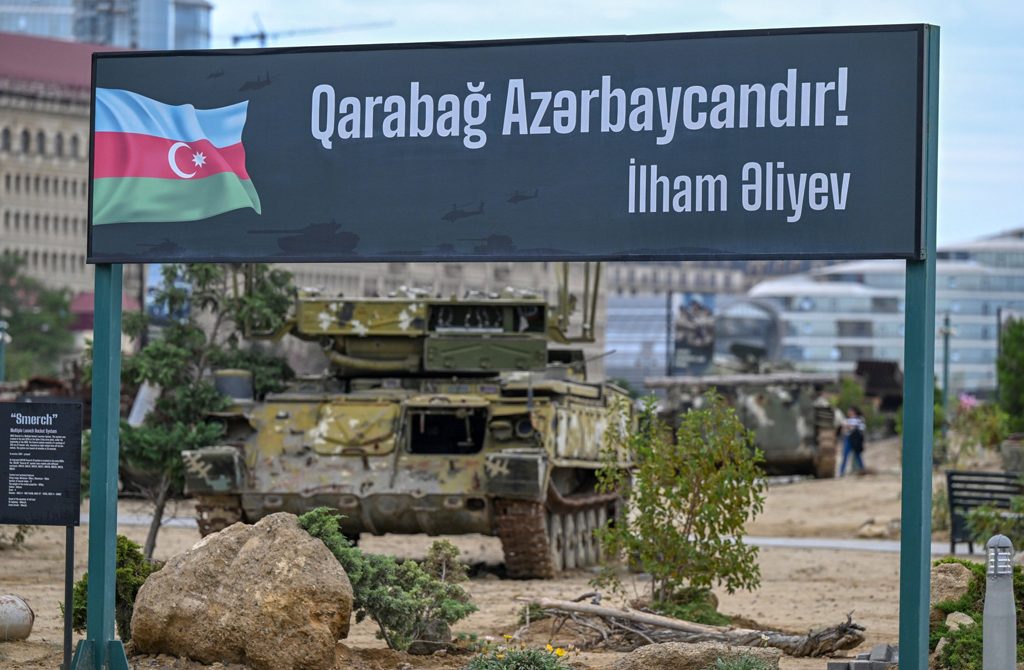The 44-day war between Azerbaijan and Armenia in 2020, which concluded with Baku’s victory, triggered a significant shift in the post-Cold War geopolitical landscape of the Caucasus region. Azerbaijan’s successful effort to partially end the Armenian occupation of Karabakh had two major implications.
Firstly, it bolstered Baku’s internal unity and gradually elevated its status as a regional player. Secondly, Türkiye’s substantial support to Azerbaijan’s military operations in Karabakh and the subsequent Shusha declaration solidified the strategic partnership between the two nations, necessitating the attention of all regional stakeholders. This situation prompted Armenia to reevaluate its foreign policy, while Russia had to adapt to a changing landscape. Iran, unable to respond to Baku’s victory as it desired, consistently voiced its discontent with the new situation. Other regional actors, such as Georgia, capitalized on the void created by Russia’s ongoing conflict in Ukraine, interpreting Azerbaijan’s military intervention as an opportunity to address their own issues.
Consequently, the Karabakh victory introduced new dynamics to the region.
The recent counterterrorism operation launched by Azerbaijan to enforce the provisions of the trilateral declaration signed between Russia, Armenia and Azerbaijan after the Karabakh war has completely altered the status quo imposed on Azerbaijan since the Cold War, giving rise to a new regional geopolitical landscape.
One notable aspect of post-Karabakh geopolitics is the evolution of the Türkiye-Azerbaijan partnership into a strategic integration. Both countries describe their relationship as “one nation, two states,” a discourse that fosters a strong sociological foundation between them. This unity is primarily rooted in ethnic and political factors. Politically, both states and societies consider Armenia as their historical “other,” although this opposition is mutual. In other words, for Armenia, Turks are also regarded as their historical “other.” With the liberation of Karabakh, the basis for this mutual antagonism may weaken, potentially paving the way for reconciliation among Türkiye, Azerbaijan and Armenia in the Caucasus region.
Dimensions of Türkiye-Azerbaijan ties
The military, political and economic dimensions of Türkiye-Azerbaijan relations that existed before the Karabakh conflict are expected to continue strengthening, becoming significant dynamics in post-Karabakh regional geopolitics. Militarily, the two countries are not only enhancing Azerbaijan’s military capabilities through defense industry agreements but also extending their military cooperation to mutual defense commitments, as evident in the Shusha declaration. This means that both nations pledge to defend each other in the event of conflict. This position was reaffirmed during the recent Karabakh crisis when Türkiye warned against Iran’s support for Armenia and assured Azerbaijan of protection. The Azerbaijani military’s capabilities have also established it as a crucial regional player. Politically and economically, Azerbaijan-Türkiye relations are emerging as a new axis in the post-Karabakh regional geopolitical landscape. Their collaboration in energy projects, including transferring Turkmenistan’s gas to Türkiye through the Caspian Sea and Azerbaijan, may elevate both countries’ prominence in the region, especially if the Zangezor corridor is opened, potentially impacting Central Asia.
However, the divergent positions among the regional and international actors in post-Karabakh geopolitics also bring uncertainties. The quest for a new foreign policy direction in Armenia is one of the uncertain dynamics. Armenian Prime Minister Nikol Pashinyan’s criticism of Russia, joint military exercises with the U.S., and anti-Russian measures could place Armenia in a delicate position between Russia and the West. Although trust in Moscow has waned in Armenian society due to events like the Ukraine war and the Karabakh conflict, Russia remains a crucial partner.
Therefore, Russia will likely play a decisive role in Armenia’s foreign policy. Nevertheless, given Russia’s entanglement in the Ukraine war and other challenges in the Caucasus, its effectiveness remains questioned. While there is potential for a Turkish-Azerbaijani axis to balance Russia’s regional involvement, neither Türkiye nor Azerbaijan may pursue such an orientation in the near term. The most pressing issue at this juncture is the potential developments in Armenian domestic politics, where a remobilization of nationalist discourse following the Karabakh defeat could prevent Armenia’s adaptation to the new situation and prolong the peace process.
Iran’s stance
Iran’s actions and stance also introduce uncertainty into post-Karabakh geopolitics. Iran’s support for Armenia is motivated by geopolitical considerations and identity concerns. Tehran views backing Armenia as a means to counterbalance the emerging power center created by the Turkish-Azerbaijani partnership, which it perceives as a threat to its identity. Efforts to establish the Zangezur corridor could undermine Iran’s economic influence in the region and result in economic losses. The corridor’s creation, which would establish a direct land connection between the Turkic world and Türkiye, is seen as another threat to Iran.
Consequently, Iran must redefine its position in post-Karabakh regional geopolitics. Iran may opt to be a spoiler and destabilizer or adopt a stance contributing to regional stability. If Iran chooses to shift its rivalry with Türkiye from the Middle East to the Caucasus and views Azerbaijan as a competitor, it could play a significant role in shaping post-Karabakh regional geopolitics.
Another source of uncertainty is the future of the normalization process between Türkiye, Armenia and Azerbaijan. Normalization talks between Türkiye and Armenia can proceed more easily if the Karabakh conflict is resolved. While the normalization process encompasses issues beyond Karabakh, reopening border crossings could yield economic benefits for the parties, potentially expediting political normalization. However, there is a risk that anti-Türkiye Armenian politics, including international Armenian lobbies, could hinder this process. If Armenia and Azerbaijan can reach a political compromise, normalization could occur more swiftly, strategically contributing to regional stability.
Finally, it is crucial to underscore the role of the United States and Europe, particularly France, in post-Karabakh geopolitics. If these countries perceive the region as a competitive arena with Russia and Türkiye, it could transform the region into a competitive strategic environment. Such a scenario would heighten the potential for conflict, deepen regional uncertainties and exacerbate the crisis resulting from Russia’s involvement in Ukraine.
In conclusion, post-Karabakh geopolitics is reshaping regional dynamics, compelling all regional actors to recalibrate their positions in response to the evolving landscape.



